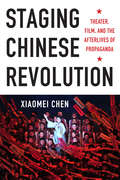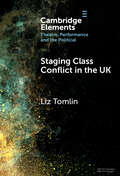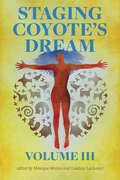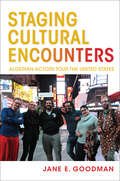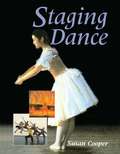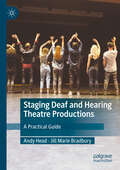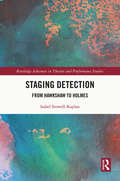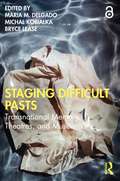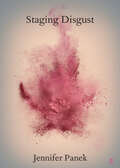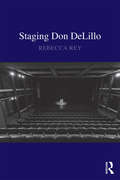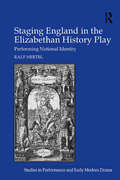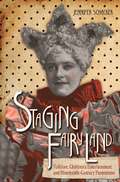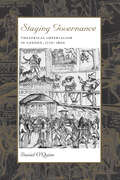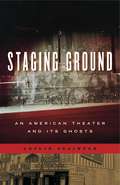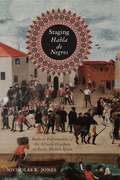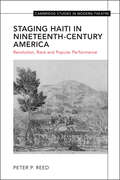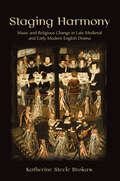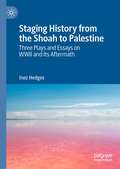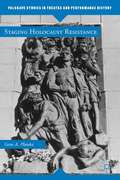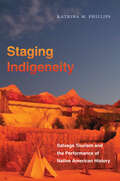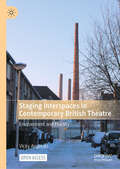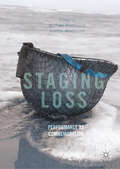- Table View
- List View
Staging Chinese Revolution: Theater, Film, and the Afterlives of Propaganda
by Xiaomei ChenStaging Chinese Revolution surveys fifty years of theatrical propaganda performances in China, revealing a dynamic, commercial capacity in works often dismissed as artifacts of censorship. Spanning the 1960s through the 2010s, Xiaomei Chen reads films, plays, operas, and television shows from an interdisciplinary and comparative perspective, demonstrating how, in a socialist state with "capitalist characteristics," propaganda performance turns biographies, memoirs, and war stories into mainstream ideological commodities, legitimizing the state and its right to rule. Analyzing propaganda performance also brings contradictions and inconsistencies to light that throw common understandings about propaganda's purpose into question.Chen focuses on revisionist histories that stage the lives of the "founding fathers" of the Communist Party, such as Chen Duxiu, Mao Zedong, and Deng Xiaoping, and the engaging mix of elite and ordinary characters that animate official propaganda in the private and public sphere. Taking the form of "personal" memories and representing star and youth culture and cyberspace, contemporary Chinese propaganda appeals through multiple perspectives, complicating relations among self, subject, agent, state building, and national identity. Chen treats Chinese performance as an extended form of political theater confronting critical issues of commemoration, nostalgia, state rituals, and contested history. It is through these reenactments that three generations of revolutionary leaders loom in extraordinary ways over Chinese politics and culture.
Staging Class Conflict in the UK (Elements in Theatre, Performance and the Political)
by null Liz TomlinThis Element focuses on the frequent staging of the most precarious fraction of the working class in the context of a theatre industry, academy and audiences that are dominated by the cultural fraction of the middle class. It interrogates the staging of an abjectified figure as a means of challenging the stigmatisation of the poor in political discourse, defined here as an ideological imaginary of moral and cultural deficit. The Element argues that in seeking to subvert such an imaginary, theatre that stages the abjectified subject may risk consolidating two further imaginaries of working class deficit that have been confected in political discourse from the 1990s to the 2020s. In conclusion, the Element reflects on the political potential of theatre that rather seeks to eradicate class descriptors, conflicts and hierarchies altogether. This title is also available as Open Access on Cambridge Core.
Staging Conventions in Medieval English Theatre
by Philip ButterworthHow was medieval English theatre performed? Many of the modern theatrical concepts and terms used today to discuss the nature of medieval English theatre were never used in medieval times. Concepts and terms such as character, characterisation, truth and belief, costume, acting style, amateur, professional, stage directions, effects and special effects are all examples of post-medieval terms that have been applied to the English theatre. Little has been written about staging conventions in the performance of medieval English theatre and the identity and value of these conventions has often been overlooked. In this book, Philip Butterworth analyses dormant evidence of theatrical processes such as casting, doubling of parts, rehearsing, memorising, cueing, entering, exiting, playing, expounding, prompting, delivering effects, timing, hearing, seeing and responding. All these concerns point to a very different kind of theatre to the naturalistic theatre produced today.
Staging Coyote's Dream Volume 3
by Monique Mojica and Lindsay LachanceOn the twentieth anniversary of its first volume, Staging Coyote’s Dream Volume III is a curated collection of new works rooted in Indigenous values, aesthetics, and narrative structures. Inspired by their own dramaturgical practices and current conversations in contemporary theatre creation, co-editors Monique Mojica and Lindsay Lachance identify the invaluable and understudied ways that many Indigenous theatre artists are creating culturally specific dramaturgical processes and shifting the paradigm for what is considered “text.” By presenting models for relational theatre-making and land-based explorations outside the traditional “well-made-play” structure, Staging Coyote’s Dream Volume III is more than just a collection of plays; it offers strategies and tools for how Indigenous artists can reimagine the structures of new-play development and performance on Turtle Island.An anthology that identifies and highlights a vast array of anti-colonial performing arts processes, including reclamation, embodiment, and community-engaged work—to name only a few—Mojica and Lachance gather the works of artists leading these practices to not only honour how their plays are expanding dramaturgy, but to build Indigenous performance literacies for all practitioners creating on Turtle Island.
Staging Cultural Encounters: Algerian Actors Tour the United States (Public Cultures of the Middle East and North Africa)
by Jane E. GoodmanAn anthropologist recounts an Algerian theater troupe’s 2016 US tour, detailing the highs and lows of the cross-cultural exchange.Staging Cultural Encounters tells stories about performances of cultural encounter and cultural exchange during the US tour of the Algerian theater troupe Istijmam Culturelle in 2016. Jane E. Goodman follows the Algerian theater troupe as they prepare for and then tour the United States under the auspices of the Center Stage program, sponsored by the US State Department to promote cross-cultural dialogue and understanding.The title of the play Istijmam produced was translated as “Apples,” written by Abdelkader Alloula, a renowned Algerian playwright, director, and actor who was assassinated in 1994. Goodman take readers on tour with the actors as they move from the Kennedy Center in Washington, D.C. to the large state universities of New Hampshire and Indiana, and from a tiny community theater in small-town New England to the stage of the avant-garde La MaMa Theater in New York City.Staging Cultural Encounters takes up conundrums of cross-cultural encounter, challenges in translation, and audience reception, offering a frank account of the encounters with American audiences and the successes and disappointments of the experience of exchange.“This is a ground-breaking and beautifully written work in the anthropology of performance as well as an intervention in experimental anthropology, wherein theater play is both ethnographic subject and method. The book is accompanied by a detailed website of audio-visual examples, making this a hyper-text, a multi-modal way of knowing. It is a tour de force.” —Deborah Kapchan, author of Theorizing Sound Writing“In this engrossing ethnography [Goodman] brings to life the excitements, hopes and disappointments of their staged cultural encounter. We are shown in fascinating detail what lies behind and before the tour: the actors’ intense disciplined dedication to avant garde theatre practices, the political and economic constraints of contemporary Algeria, the labour of translation, the performance traditions of the Algerian market place. . . . Subtle, searching and empathetic, with touches of wry humor, Goodman’s study will become an instant classic in anthropology, theatre and performance studies.” —Karin Barber, London School of Economics, author of A History of African Popular Culture
Staging Dance (Ballet, Dance, Opera And Music Ser.)
by Susan CooperStaging Dance is a practical handbook that covers all aspects of putting on a dance production. It highlights the current diversity of dance activities, choosing examples from working dance groups and from individual dancers.The book includes sections on choreography, music and sound, designing and making sets and costumes, lighting design and technical implementation and stage management. Funding, planning and publicity are also covered.Staging Dance will prove invaluable not only to dance artists, but also those working along side them: musicians, designers, lighting technicians, administrators and directors.
Staging Deaf and Hearing Theatre Productions: A Practical Guide
by Andy Head Jill Marie BradburyThis book explores an unacknowledged gap in theatre study and praxis, and establishes an inceptive model for transforming a playscript into a theatrical production involving deaf and hearing artists. The book stipulates that theatrical productions of this nature should strive to go beyond accessibility towards inclusivity by considering deaf perspectives at every stage of the process: When deaf actors are cast in roles assumed to be hearing, how does this change the world of the play? How does the inclusion of a visual language affect staging decisions? How can truly equal access to two different language modalities be achieved for diverse production teams and audiences? Because deaf artists should be involved in the leadership and creative decision making throughout the process, this book is co-written by a deaf and hearing team. The main topics of the book include pre-production preparation, the rehearsal process, and performance. As deaf theatre artists move increasingly into the foreground, it’s time for the hearing theatre world to learn how to undertake productions that successfully bridge the deaf and hearing worlds. By including the perspective of directors, actors, designers, and audience members, this guide lays out an ideal process towards achieving that goal.
Staging Detection: From Hawkshaw to Holmes (Routledge Advances in Theatre & Performance Studies)
by Isabel Stowell-KaplanStaging Detection reveals how the new figure of the stage detective emerged in nineteenth-century Britain. The first book to explore the productive intersections between detection and performance across a range of Victorian plays, Staging Detection foregrounds the role of the stage detective in shaping important theatrical modes of the period, from popular melodrama to society comedy. Beginning in 1863 with Tom Taylor’s blockbuster play, The Ticket-of-Leave Man, the book criss-crosses London following the earliest performances of stage detectives. Centring the work of playwrights, novelists, critics and actors, from Sarah Lane and Horace Wigan to Wilkie Collins and Oscar Wilde, Staging Detection sheds new light on Victorian acting styles, furthers our understanding of melodrama, and resituates the famous Wildean dandy as a successor to the stage detective. Drawing on histories of masculinity and gender performance as well as developing scientific theory and nineteenth-century visual culture, Staging Detection shows how the earliest stage portrayals of the detective shaped broader Victorian debates concerning fraud, omniscience and earned authority. This book will be of great interest to students and scholars of theatre history, Victorian literature and popular culture – as well as anyone with an interest in the figure of the detective.
Staging Difficult Pasts: Transnational Memory, Theatres, and Museums
by Maria M. Delgado Michal Kobialka Bryce LeaseThis collection of original essays brings together museum, theatre, and performance case studies with a focus on their distinctive and overlapping modes of producing memory for transnational audiences. Whether this is through narrative, object, embodied encounter or a combination of the three, this volume considers distinctions and interactions between memory and history specifically through the lenses of theatre and performance studies, visual culture, and museum and curator studies. This book is underpinned by three areas of research enquiry: How are contemporary theatre makers and museum curators staging historical narratives of difficult pasts? How might comparisons between theatre and museum practices offer new insights into the role objects play in generating and representing difficult pasts? What points of overlap, comparison, and contrast among these constructions of history and memory of authoritarianism, slavery, colonialism, genocide, armed conflict, fascism, and communism might offer an expanded understanding of difficult pasts in these transnational cultural contexts? This collection is designed for any scholar of its central disciplines, as well as for those interested in cultural geography, memory studies, and postcolonial theory. The Open Access version of this book, available at http://www.taylorfrancis.com, has been made available under a Creative Commons Attribution-NoDerivatives (CC-BY-ND) 4.0 license.
Staging Disgust: Rape, Shame, and Performance in Shakespeare and Middleton (Elements in Shakespeare Performance)
by Jennifer PanekThis Element turns to the stage to ask a simple question about gender and affect: what causes the shame of the early modern rape victim? Beneath honour codes and problematic assumptions about consent, the answer lies in affect, disgust. It explores both the textual "performance" of affect, how literary language works to evoke emotions and the ways disgust can work in theatrical performance. Here Shakespeare's poem The Rape of Lucrece is the classic paradigm of sexual pollution and shame, where disgust's irrational logic of contamination leaves the raped wife in a permanent state of uncleanness that spreads from body to soul. Staging Disgust offers alternatives to this depressing trajectory: Middleton's Women Beware Women and Shakespeare's Titus Andronicus perform disgust with a difference, deploying the audience's revulsion to challenge the assumption that a raped woman should “naturally” feel intolerable shame.
Staging Don DeLillo
by Rebecca ReyThe first book-length study to focus on Don DeLillo's plays, Staging Don DeLillo brings the author's theatre works to the forefront. Rebecca Rey explores four central themes that emerge across DeLillo's theatre oeuvre: the centrality of language; the human fear of death; the elusiveness of truth; and the deceptive, slippery nature of personal identity. Rey examines all seven of DeLillo's plays chronologically: "The Engineer of Moonlight" (1979), The Day Room (1986), the one-minute plays "The Rapture of the Athlete Assumed Into Heaven" (1990), and "The Mystery at the Middle of Ordinary Life" (2000), Valparaiso (1999), Love-Lies-Bleeding (2006), and The Word for Snow (2014). Written in clear, accessible language, and interweaving critique of DeLillo's novels throughout, this book will appeal not only to DeLillo scholars but also to anyone working on contemporary literature and drama.
Staging England in the Elizabethan History Play: Performing National Identity (Studies In Performance And Early Modern Drama Ser.)
by Ralf HertelApplying current political theory on nationhood as well as methods established by recent performance studies, this study sheds new light on the role the public theatre played in the rise of English national identity around 1600. It situates selected history plays by Shakespeare and Marlowe in the context of non-fictional texts (such as historiographies, chorographies, political treatises, or dictionary entries) and cultural artefacts (such as maps or portraits), and thus highlights the circulation, and mutation, of national thought in late sixteenth-century culture. At the same time, it goes beyond a New Historicist approach by foregrounding the performative surplus of the theatre event that is so essential for the shaping of collective identity. How, this study crucially asks, does the performative art of theatre contribute to the dynamics of the formation of national identity? Although theories about the nature of nationalism vary, a majority of theorists agree that notions of a shared territory and history, as well as questions of religion, class and gender play crucial roles in the shaping of national identity. These factors inform the structure of this book, and each is examined individually. In contrast to existing publications, this inquiry does not take for granted a pre-existing national identity that simply manifested itself in the literary works of the period; nor does it proceed from preconceived notions of the playwrights’ political views. Instead, it understands the early modern stage as an essentially contested space in which conflicting political positions are played off against each other, and it inquires into how the imaginative work of negotiating these stances eventually contributed to a rising national self-awareness in the spectators.
Staging Fairyland: Folklore, Children's Entertainment, and Nineteenth-Century Pantomime (Series in Fairy-Tale Studies)
by Jennifer SchackerIn nineteenth-century Britain, the spectacular and highly profitable theatrical form known as "pantomime" was part of a shared cultural repertoire and a significant medium for the transmission of stories. Rowdy, comedic, and slightly risqué, pantomime productions were situated in dynamic relationship with various forms of print and material culture. Popular fairy-tale theater also informed the production and reception of folklore research in ways that are often overlooked. In Staging Fairyland: Folklore, Children’s Entertainment, and Nineteenth-Century Pantomime, Jennifer Schacker reclaims the place of theatrical performance in this history, developing a model for the intermedial and cross-disciplinary study of narrative cultures. The case studies that punctuate each chapter move between the realms of print and performance, scholarship and popular culture. Schacker examines pantomime productions of such well-known tales as "Cinderella," "Little Red Riding Hood," and "Jack and the Beanstalk," as well as others whose popularity has waned—such as, "Daniel O’Rourke" and "The Yellow Dwarf." These productions resonate with traditions of impersonation, cross-dressing, literary imposture, masquerade, and the social practice of "fancy dress." Schacker also traces the complex histories of Mother Goose and Mother Bunch, who were often cast as the embodiments of both tale-telling and stage magic and who move through various genres of narrative and forms of print culture. These examinations push at the limits of prevailing approaches to the fairy tale across media. They also demonstrate the degree to which perspectives on the fairy tale as children's entertainment often obscure the complex histories and ideological underpinnings of specific tales. Mapping the histories of tales requires a fundamental reconfiguration of our thinking about early folklore study and about "fairy tales": their bearing on questions of genre and ideology but also their signifying possibilities—past, present, and future. Readers interested in folklore, fairy-tale studies, children’s literature, and performance studies will embrace this informative monograph.
Staging Governance: Theatrical Imperialism in London, 1770–1800
by Daniel O'QuinnBetween 1770 and 1800, transformations in the relationship between metropolitan British society and its colonial holdings, and in the concept of the nation itself, left Britons with a new sense of themselves. Over the same period, the consolidation of the middle classes was accompanied by growing social constraints on sexuality and family life. Staging Governance locates the intersection of these two trends in the representation of British India on the London stage. Theatrical productions, especially those representing colonial life, pushed the limits of public discourse on sexuality and colonialism even as the government made efforts to shape and narrow them. At the same time, official discourse on colonial practices, such as the public trials of Clive and Hastings, became theatrical events themselves. Exploring this rapidly shifting world through a series of original readings of dramatic texts and important moments of oratory, Staging Governance demonstrates how the perceived crises of imperial and domestic Britain joined these spheres in the popular imagination. The economics of political and sexual exchange not only became entwined but functioned as mutual supports during a period of social, cultural, and political readjustment.
Staging Ground: An American Theater and Its Ghosts (Keystone Books)
by Leslie StaintonIn this poignant and personal history of one of America’s oldest theaters, Leslie Stainton captures the story not just of an extraordinary building but of a nation’s tumultuous struggle to invent itself. Built in 1852 and in use ever since, the Fulton Theatre in Lancaster, Pennsylvania, is uniquely ghosted. Its foundations were once the walls of a colonial jail that in 1763 witnessed the massacre of the last surviving Conestoga Indians. Those same walls later served to incarcerate fugitive slaves. Staging Ground explores these tragic events and their enduring resonance in a building that later became a town hall, theater, and movie house—the site of minstrel shows, productions of Uncle Tom’s Cabin, oratory by the likes of Thaddeus Stevens and Mark Twain, performances by Buffalo Bill and his troupe of “Wild Indians,” Hollywood Westerns, and twenty-first-century musicals. Interweaving past and present, private anecdote and public record, Stainton unfolds the story of this emblematic space, where for more than 250 years Americans scripted and rescripted their history. Staging Ground sheds light on issues that continue to form us as a people: the evolution of American culture and faith, the immigrant experience, the growth of cities, the emergence of women in art and society, the spread of advertising, the flowering of transportation and technology, and the abiding paradox of a nation founded on the principle of equality for “all men,” yet engaged in the slave trade and in the systematic oppression of the American Indian.
Staging Ground: An American Theater and Its Ghosts (Keystone Books)
by Leslie StaintonIn this poignant and personal history of one of America’s oldest theaters, Leslie Stainton captures the story not just of an extraordinary building but of a nation’s tumultuous struggle to invent itself. Built in 1852 and in use ever since, the Fulton Theatre in Lancaster, Pennsylvania, is uniquely ghosted. Its foundations were once the walls of a colonial jail that in 1763 witnessed the massacre of the last surviving Conestoga Indians. Those same walls later served to incarcerate fugitive slaves. Staging Ground explores these tragic events and their enduring resonance in a building that later became a town hall, theater, and movie house—the site of minstrel shows, productions of Uncle Tom’s Cabin, oratory by the likes of Thaddeus Stevens and Mark Twain, performances by Buffalo Bill and his troupe of “Wild Indians,” Hollywood Westerns, and twenty-first-century musicals. Interweaving past and present, private anecdote and public record, Stainton unfolds the story of this emblematic space, where for more than 250 years Americans scripted and rescripted their history. Staging Ground sheds light on issues that continue to form us as a people: the evolution of American culture and faith, the immigrant experience, the growth of cities, the emergence of women in art and society, the spread of advertising, the flowering of transportation and technology, and the abiding paradox of a nation founded on the principle of equality for “all men,” yet engaged in the slave trade and in the systematic oppression of the American Indian.
Staging Habla de Negros: Radical Performances of the African Diaspora in Early Modern Spain (Iberian Encounter and Exchange, 475–1755 #3)
by Nicholas R. JonesIn this volume, Nicholas R. Jones analyzes white appropriations of black African voices in Spanish theater from the 1500s through the 1700s, when the performance of Africanized Castilian, commonly referred to as habla de negros (black speech), was in vogue.Focusing on Spanish Golden Age theater and performative poetry from authors such as Calderón de la Barca, Lope de Rueda, and Rodrigo de Reinosa, Jones makes a strong case for revising the belief, long held by literary critics and linguists, that white appropriations and representations of habla de negros language are “racist buffoonery” or stereotype. Instead, Jones shows black characters who laugh, sing, and shout, ultimately combating the violent desire of white supremacy. By placing early modern Iberia in conversation with discourses on African diaspora studies, Jones showcases how black Africans and their descendants who built communities in early modern Spain were rendered legible in performative literary texts.Accessibly written and theoretically sophisticated, Jones’s groundbreaking study elucidates the ways that habla de negros animated black Africans’ agency, empowered their resistance, and highlighted their African cultural retentions. This must-read book on identity building, performance, and race will captivate audiences across disciplines.
Staging Haiti in Nineteenth-Century America: Revolution, Race and Popular Performance (Cambridge Studies in Modern Theatre)
by Peter ReedAmerican culture maintained a complicated relationship with Haiti from its revolutionary beginnings onward. In this study, Peter P. Reed reveals how Americans embodied and re-enacted their connections to Haiti through a wide array of performance forms. In the wake of Haiti's slave revolts in the 1790s, generations of actors, theatre professionals, spectators, and commentators looked to Haiti as a source of both inspiring freedom and vexing disorder. French colonial refugees, university students, Black theatre stars, blackface minstrels, abolitionists, and even writers such as Herman Melville all reinvented and restaged Haiti in distinctive ways. Reed demonstrates how Haiti's example of Black freedom and national independence helped redefine American popular culture, as actors and audiences repeatedly invoked and suppressed Haiti's revolutionary narratives, characters, and themes. Ultimately, Haiti shaped generations of performances, transforming America's understandings of race, power, freedom, and violence in ways that still reverberate today.
Staging Harmony: Music and Religious Change in Late Medieval and Early Modern English Drama
by Katherine Steele BrokawIn Staging Harmony, Katherine Steele Brokaw reveals how the relationship between drama, music, and religious change across England's long sixteenth century moved religious discourse to more moderate positions. It did so by reproducing the complex personal attachments, nostalgic overtones, and bodily effects that allow performed music to evoke the feeling, if not always the reality, of social harmony. Brokaw demonstrates how theatrical music from the late fifteenth to the early seventeenth centuries contributed to contemporary discourses on the power and morality of music and its proper role in religious life, shaping the changes made to church music as well as people’s reception of those changes. In representing social, affective, and religious life in all its intricacy, and in unifying auditors in shared acoustic experiences, staged musical moments suggested the value of complexity, resolution, and compromise rather than oversimplified, absolutist binaries worth killing or dying for.The theater represented the music of the church’s present and past. By bringing medieval and early Tudor drama into conversation with Elizabethan and Jacobean drama, Brokaw uncovers connections and continuities across diverse dramatic forms and demonstrates the staying power of musical performance traditions. In analyzing musical practices and discourses, theological debates, devotional practices, and early staging conditions, Brokaw offers new readings of well-known plays (Marlowe’s Doctor Faustus, Shakespeare’s The Tempest and The Winter’s Tale) as well as Tudor dramas by playwrights including John Bale, Nicholas Udall, and William Wager.
Staging History from the Shoah to Palestine: Three Plays and Essays on WWII and Its Aftermath
by Inez HedgesThis book is a contribution to the emerging field of research-based performance, which seeks to gain a wider audience for issues that are crucial to our understanding of history and to informing our future actions. The book examines the role of theater in portraying the Shoah in France, the French Resistance, and the Israeli-Palestinian conflict. Each of the three chapters consists of an original dramatic work by the author and an accompanying critical essay.
Staging Holocaust Resistance
by Gene A. PlunkaPlunka argues that drama is the ideal art form to revitalize the collective memory of Holocaust resistance. This comparative drama study examines a variety of international plays - some quite well-known, others more obscure - that focus on collective or individual defiance of the Nazis.
Staging Indigeneity: Salvage Tourism and the Performance of Native American History
by Katrina PhillipsAs tourists increasingly moved across the United States in the late nineteenth and early twentieth centuries, a surprising number of communities looked to capitalize on the histories of Native American people to create tourist attractions. From the Happy Canyon Indian Pageant and Wild West Show in Pendleton, Oregon, to outdoor dramas like Tecumseh! in Chillicothe, Ohio, and Unto These Hills in Cherokee, North Carolina, locals staged performances that claimed to honor an Indigenous past while depicting that past on white settlers' terms. Linking the origins of these performances to their present-day incarnations, this incisive book reveals how they constituted what Katrina Phillips calls "salvage tourism"—a set of practices paralleling so-called salvage ethnography, which documented the histories, languages, and cultures of Indigenous people while reinforcing a belief that Native American societies were inevitably disappearing. Across time, Phillips argues, tourism, nostalgia, and authenticity converge in the creation of salvage tourism, which blends tourism and history, contestations over citizenship, identity, belonging, and the continued use of Indians and Indianness as a means of escape, entertainment, and economic development.
Staging Interspaces in Contemporary British Theatre: Environment and Fluidity
by Vicky AngelakiThis open access book considers how relationships to place and spatial ecologies more broadly are becoming redefined in light of intersecting climate, health, identity and care crises. Through an interdisciplinary, intersectional discourse it investigates how spaces of liminality frame contemporary human conditions in their interactional modes with both human and non-human ecologies. The interspace grounds the discussion, indicating states of flux and transience, where the in-between is the defining characteristic. This open access monograph, then, takes up the new complexity in one’s relationship(s) to their surrounding spaces through a rigorous discussion of texts and performance contexts in cutting-edge contemporary British theatre on a national and international scale. It seeks to address how in-betweenness spatially, temporally, environmentally, geographically and socially conceived has been emerging as the primary state for the unmoored individual of our time – and how it might serve as catalyst for performing one's agency in modes more empathetic not only to other humans, but, also, and equally, to the non-human world.
Staging Loss: Performance as Commemoration
by Michael Pinchbeck Andrew WestersideThis book locates and critically theorises an emerging field of twenty-first century theatre practice concerned, either thematically, methodologically, or formally, with acts of commemoration and the commemorative. With notions of memorial, celebration, temporality and remembrance at its heart, and as a timely topic for debate, this book asks how theatre and performance intersects with commemorative acts or rituals in contemporary theatre and performance practice. It considers the (re)performance of history, commemoration as a form of, or performance of, ritual, performance as memorial, performance as eulogy and eulogy as performance. It asks where personal acts of remembrance merge with public or political acts of remembrance, where the boundary between the commemorative and the performative might lie, and how it might be blurred, broken or questioned. It explores how we might remake the past in the present, to consider not just how performance commemorates but how commemoration performs.
Staging Modern American Life
by Thomas FahyThe theatrical works of Millay, Cummings, and Dos Passos, which have largely been marginalized in discussions of theatre history and literary scholarship, offer a hybrid theatre that integrates the popular with the formal, the mainstream with the experimental. Fahy examines the integration of and challenges to popular culture found in their works and offers new readings with an eye to American cultural studies.
